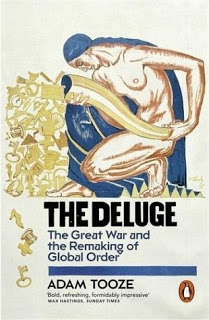

| Online: | |
| Visits: | |
| Stories: |

| Story Views | |
| Now: | |
| Last Hour: | |
| Last 24 Hours: | |
| Total: | |
Adam Tooze’s The Deluge
Monday, March 6, 2017 5:28
% of readers think this story is Fact. Add your two cents.
British historian Adam Tooze’s 2014 book The Deluge: The Great War, America and the Remaking of the Global Order, 1916-1931 takes an original and distinctive approach to the First World War. Tooze is not interested in how the war started nor in how it was fought. Only one thing really mattered – the entry of the United States into the war. US intervention had virtually no effect on the course of the actual war itself but it had a profound effect on the peace negotiations and on the postwar world. It changed everything. From that moment on the US was the world’s dominant power. The only question was how the US would exercise that power.
President Woodrow Wilson had very definite ideas on the subject. The failure of Wilson’s version of global internationalism has obscured the fact that the US, even under the supposedly isolationist Republican administrations of the 1920s, was not only the world’s dominant economic power but also the dominant political power.
For the other European powers, bankrupted by the war and reduced to financial dependence on the US, the question was what could they do about the situation? In Tooze’s view Soviet communism and the various strands of fascism represented an attempt to confront this problem.
For Britain the situation was exceptionally complex. Britain appeared to have emerged from the war stronger than ever but this was an illusion. Britain’s Empire was a large part of the problem. Maintaining and defending the Empire was far beyond Britain’s resources. The Empire had been a potential source of wealth but no British government had ever figured out how to make this potential actual. The rising tide of nationalism made it unlikely that Britain could hold on to its imperial possessions in the long term but no government was prepared to admit this. By the 1920s the Empire was largely an illusion, but despite this Britain very unwisely embarked on fresh imperial adventures in the Middle East.
Tooze (who is essentially an economic historian) focuses on some of the lesser known economic problems confronting the world during this period, such as the catastrophic American recession of 1920. He also points out that hyper-inflation was by no means confined to the Weimar Republic. Overshadowing everything else was the problem of how to pay for the First World War. The US had in fact bankrolled the war efforts of the French, the British and the Italians but now the debts were going to have to be repaid and the US was determined that every red cent would be repaid. This was a problem for the French, with much of their country in ruins and their economy in a shambles. Of course it seemed like a very attractive idea for the French to make the Germans pay for their war damage, but with the German economy in an even bigger shambles that was only going to lead to more problems and in any case Germany was simply not in a position to pay what was demanded.
The war had serious unbalanced the world economy in other ways as well, inflation was a problem everywhere, and the prospects for Europe were undecidedly unpleasant.
The war also unleashed political problems. Wilson’s ideas on self-determination were not quite as crazy and unrealistic as they’re often portrayed but breaking up the Ottoman and Hapsburg empires was in retrospect a reckless step. The war also led to demands for greater democracy throughout the world, democracy being seen as some sort of magical answer to political problems (in practice it naturally produced ever more corrupt and ever more incompetent governments).
Tooze also mentions a number of fascinating events that seem to have disappeared down the memory hole, such as the French invasion of Germany in 1923. The 1920s was actually quite a tumultuous period in terms of the foreign policies of the various powers. There was a sense that a new world order was emerging but it was not clear what shape it would take.
Tooze is no great literary stylist but his writing is generally clear and workmanlike.
Most books on the interwar period focus on the 1930s so it’s interesting to find a really in-depth study of the 20s. Tooze offers plenty of food for thought. Highly recommended.
Source: http://anotherpoliticallyincorrectblog.blogspot.com/2017/03/adam-toozes-deluge.html



